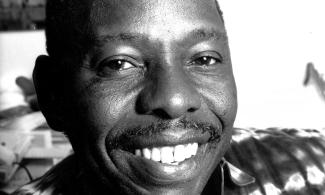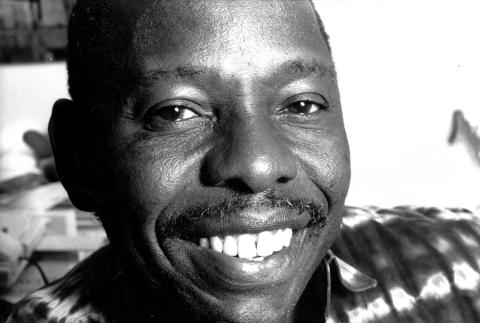
October 10, 1941-November 10, 1995
The world was shocked when General Sani Abacha ordered the execution of Kenule Saro-Wiwa, Saturday Dobee, Nordu Eawo, Daniel Gbooko, Paul Levera, Felix Nuate, Baribor Bera, Barinem Kiobel and John Kpuine on November 10, 1995. The diminutive author and activist had been a leading voice for environmental justice and the rights of the Ogoni nationality of about 500,000 people to self-determination. The military regime killed his body but the message he heralded remains loud in the ears of those who despoil the earth and oppress the downtrodden, particularly of the minority nationalities in the Niger delta.

Born on October 10, 1941 to the family of an Ogoni chief Jim Wiwa in Bori, “Ken” showed an intense sense of curiosity and brilliance as a youngster. He attended the Government College Umuahia and secured a scholarship to study English at the University of Ibadan. He initially wanted to stay in the academia, taking up a job as teaching assistant at the University of Lagos after leaving UI. But this was just for a brief while.
He returned to Bonny in the Niger delta where he was made a Civilian Administrator. When the Civil War broke out, he supported the federal side because he believed that micro-minorities such as the Ogoni could face even worse marginalisation if the Biafran secession had succeeded. After the war, he was made Commissioner of Education in the newly established Rivers state. But by 1973 he was sacked because he insisted on the need for the Ogoni to be autonomous within the state.He then moved into private business with interests in real estate and retail trade. In the 1980s he concentrated more on his talents as an author and journalist. He also produced the very popular television comedy series Basi and Company at this time. Saro-Wiwa was convinced to return to politics in 1987 by Babangida, when the military regime commenced its transition programme.
Ken Saro-Wiwa soon fell out with Babangida and his political transition, when it dawned on him that the programme was actually meant to head to nowhere. He became a founding member of the Movement for the Survival of the Ogoni People (MOSOP) in 1990, devoting the last five years of his life to the struggle for environmental justice and the betterment of the lives of the Ogoni. He tirelessly campaigned on the platform of the Ogoni Bill of Rights internationally. And within Nigeria MOSOP joined the then ongoing coalescing of “mass democratic organisations” into the Campaign for Democracy united front, and Saro-Wiwa was elected into the CD leadership at its founding Convention in November 1991.
The rising tide of MOSOP’s influence within Ogoni land and far beyond became very worrisome for the military government. In 1992, it detained Ken for several months. But this did not douse the fires blazing against transnational oil corporations (particularly Shell) and the state. On December 3, MOSOP demanded compensation for the despoliation of Ogoni land and the payment of back royalties from Shell, NNPC and Chevron, failing which the movement committed itself to driving them off Ogoni land within 30days. 31 days later, on January 4, 1993 300,000 Ogoni people marched under the banner of MOSOP to protest against Shell’s continued rape of the environment and exploitation of the people. This was more than half of the entire Ogoni population and the largest mass action ever taken against an oil company anywhere in the world. Haven been organised as the International Year of Indigenous Peoples was unfolding, it received global acclaim. Rattled, the state militarily occupied Ogoni land.
It was not only the Nigerian state that was flustered by this rising. Leaked minutes of a top management meeting of Shell at its Central Offices in early February showed the corporation had decided to ensure that the “movements of key players” within MOSOP like Saro-Wiwa were to be closely monitored. Shell fully supported the occupation force in Ogoni land with “field allowances” for the soldiers and provision of money for arms and ammunition.
Repression became the order of the day. Ken was detained several times in the course of that year. But despite this, Ogoni land was the only place where CD’s campaign for the boycott of the June 12 election was successfully enforced. Ken was again detained, this time for one month (his third detention that year). With the resistance being waged within Nigeria, MOSOP and Saro-Wiwa as its main spokesperson’s profile rose globally, and he was elected Vice-Chair of the Unrepresented Nations and People’s Organisation General Assembly.
The macabre drama leading to the “judicial murder” of the Ogoni 9 started on May 21, 199. Soldiers had taken over the Ogoni community of Gokana very early in the morning, and Saro-Wiwa was barred from entering the town. Before the end of the day, four conservative chiefs who stood for a more conciliatory strategy with the state had been killed. The military government insisted that their murderers were Ogoni youths incited by Ken Saro-Wiwa, despite being far away from the scene. Several observers looking more closely at the context of the events of that fateful day conclude that it was a lethal set-up with the blood-soaked aim of finding a reason to charge Saro-Wiwa and his compatriots with homicide.
The MOSOP leaders arrested in the wake of those murders were detained for a year before charges were levelled against them, in a tribunal headed by Justice Auta. The trial was so clearly a travesty while it lasted that defence lawyers, including Gani Fawehinmi withdrew from the case, declaring the process as being designed to ensure the defendants face the hangman’s noose. Quite a number of the defendants brought up by the prosecution were later to confess that they were bribed with money and promises of jobs with Shell. Despite the obvious charade that the trial was, the Ogoni 9 were declared guilty as charged and sentenced to death. Ten days after the draconian sentence was passed, in spite of worldwide condemnation of it and with twenty more days left before the appeal against it would expire, the nine martyrs were hanged in prison.
But, even in death, Ken Saro-Wiwa and his compatriots mocked the mediocre men behind the hangman. As the Global Day of Remembrance of Martyrs of Environmental Justice, November 10 is now emblazoned worldwide within the repertoire of resistance to the status quo. 20 years after, not learning from history, the Nigerian state impounded the “Saro-Wiwa bus”, a symbolic work of art that had been designed to mark the 10th year anniversary of the hangings, in London, at the ports. Social Action, a civic organisation with roots in the Niger delta had requested for the memorabilia to use during the 20th anniversary commemoration of that dark day.
Retired Colonel Hammed Ali, the Comptroller-General of Customs who ordered this action represented the army on the Justice Auta tribunal 20 years ago. Today once again, he stands on the wrong side of history, nailing the coffin of his eternal condemnation where the diminutive Ken Saro-Wiwa lives on, in the struggle of the poor Ogoni people and all oppressed peoples fighting to change the world.